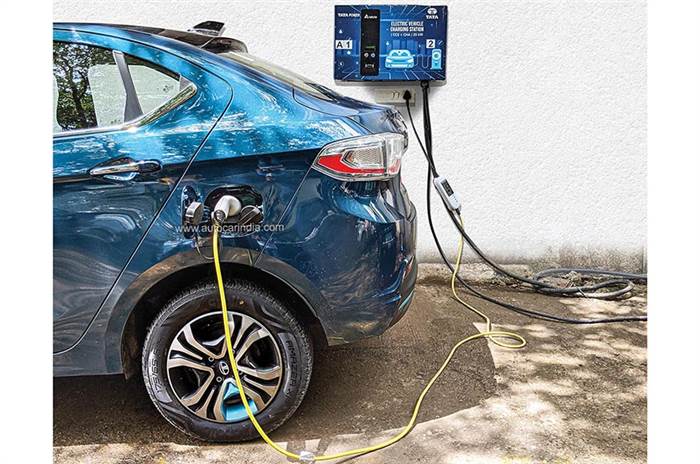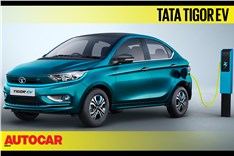2021 Tata Tigor EV facelift review, road test
Does this all-electric sedan have what it takes to replicate the Tata Nexon EV’s success?
Published on Oct 17, 2021 09:00:00 AM
39,697 Views
Follow us on
Our range test was carried out in the default drive setting, with the climate control set to Eco mode. With its top-speed capped at 116kph (121kph on the speedo), and by maintaining steady expressway speeds between 80 and 100kph, it returned an efficiency of 6.98km per kWh, translating into a highway range of 181km (6.89km/kWh multiplied by 26kWh) on a full charge. In stop-go city driving scenarios, it manages 7.69km per kWh, translating into a city range of 200km (7.69km/kWh multiplied by 26kWh).
In sub-10 percent battery level, which we went to on multiple occasions, the motor further cuts down power and limits top speed to 57kph (on the speedometer) to maximise range.

On using a 25kW Tata Power DC fast charger, we recouped 76 percent of battery charge (from 8 to 84 percent) in a 62 minutes. This service costed Rs 353.84, translating into a running cost of roughly Rs 2.2 per kilometre. It must be noted that topping up the battery from 95 to 100 percent takes around 30 minutes, as the car’s battery management system (BMS) reduces the charging rate to preserve the battery’s life.
| Tata Tigor EV Price, Mileage, Specifications, Features and Variants | |
|---|---|
| Brand | Tata |
| Model Name | Tigor EV |
| Tata Tigor EV Price | ₹ 14.48 - 15.62 lakh |
| Tata Tigor EV Range/Mileage | Electric : 213km |
| Tata Tigor EV Specifications | Sedan | 5 doors | 5 seats View All Specs |
| Tata Tigor EV Features | Halogen headlight | 3.9-inch Screen display | 2 airbags View All Features |
| Tata Tigor EV Variants | XE | XT | XZ+ View All Variants |
To fully charge the battery from 8 percent using a 15A home charger, it will take a little over 10 hours. Home charging will cost users between Rs 5 and Rs 8 per unit consumed, depending on the electricity provider and the slab they fall under. Taking the highest slab of Rs 8 into account, each full charge, from 0-100 percent, will theoretically cost users Rs 208 (Rs 8 multiplied by 26 units), resulting in a running cost of Rs 1.10 per kilometre of average city-highway usage, which is significantly lower than the Tigor petrol-auto’s Rs 7.55 per kilometre running cost.
Copyright (c) Autocar India. All rights reserved.





Comments
Member Login
Personal Details
No comments yet. Be the first to comment.